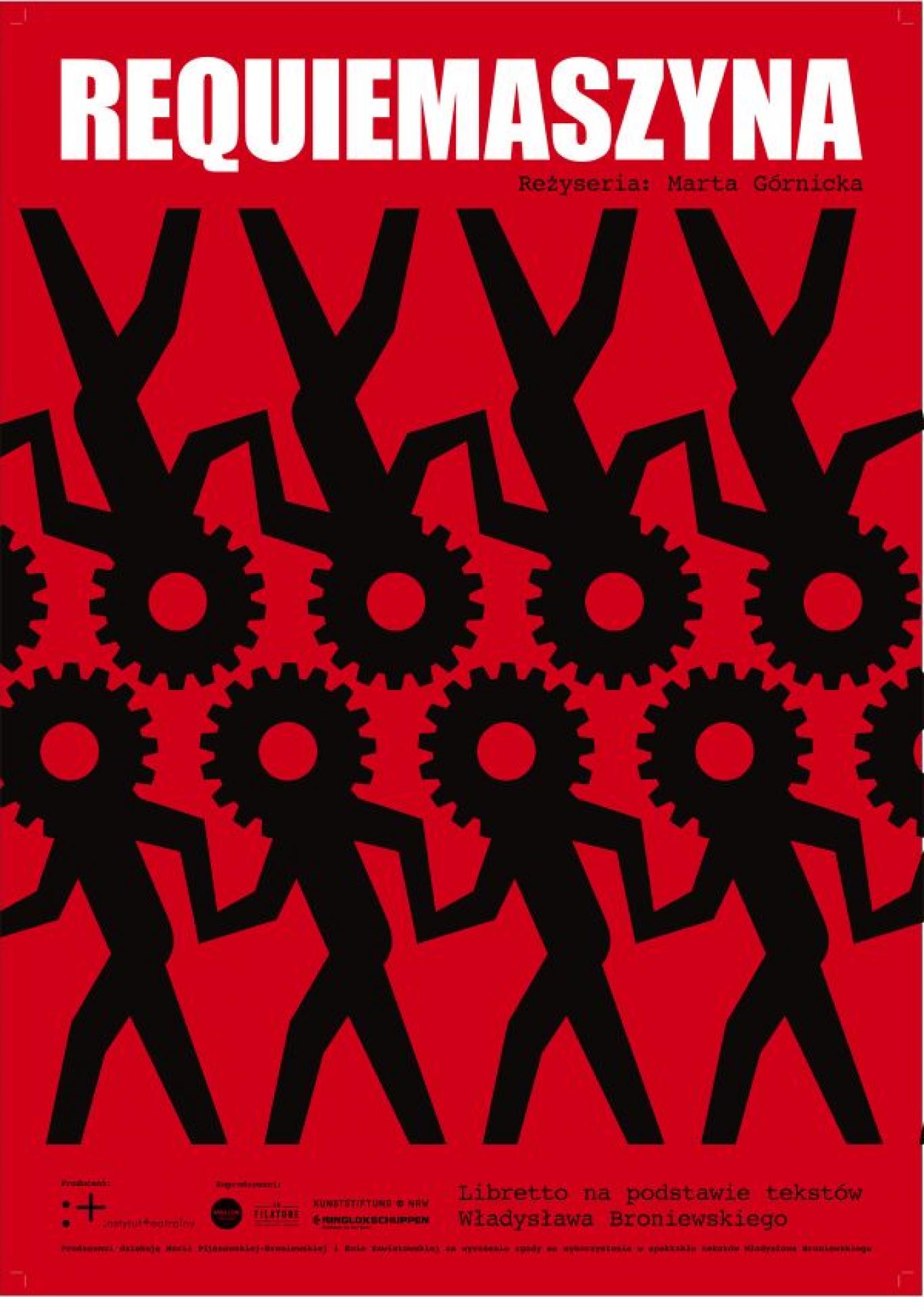Marta Górnicka's third production is a continuation of her project for a modern tragic CHORUS that serves as a means of critical reflection upon man as shaped by the norms of culture, society, the economy and religion. This time, the voice of the CHORUS is directed against the universal domination of market forces. It is the body/voice of a society torn between the fear of unemployment and the excessive demands of the workplace. A choir takes the stage to perform an ecstatic requiem for a system in which freedom has been transformed into the technology of power. The libretto makes use of poems by Władysław Broniewski, fragments of speeches, letters, and children's counting-out rhymes, which the CHORUS intersperses with philosophical discourse, advertising slogans, Socialist Realist songs, and heavy metal music.
I am the burnt offering of every system, Broniewski wrote, highlighting the dramatic tension between the crushing pressure of ideology and his belief in the power of the poetic word that was to revolutionize the world and save human subjectivity. Today, these texts, transposed onto the choral apparatus of collective body and voice, are truly striking. Revolutionary poems from the 1930s sound like a corporate anthem extolling performance in the workplace.
"REQUIEMACHINE" is an essay about the relationship of money and power. It was originally inspired by the robotic rhythms of Broniewski's poetry and his harrowing biography, which I mashed up with Benetton's Unemployee of the Year advertising campaign, the Imperial March from "Star Wars", and the rasp of the poet's cancer-stricken voice. I wanted to expose the totalitarianism of contemporary strategies of supervision and discipline: mechanisms that transform residents of the neo-liberal paradise into an army of robotic workers.
Marta Górnicka
The producers would like to thank Maria Pijanowska-Broniewska and Ewa Zawistowska for granting the performance rights to texts by Władysław Broniewski.
duration: 50 minutes (no intermission)
Pre-premiere: 24.03.2013 Zbigniew Raszewski Theatre Institute, Warsaw
French premiere: 22.05.2013 La Filature - Scène Nationale, Mulhouse
German premiere: 14.06.2013 Ringlokschuppen, Mülheim an der Ruhr
FIND A JOB UP YOUR ASS
The system fears a chorus. A chorus of the critical. A chorus of the outraged. A chorus generates collective energy, a kind of energy those in power don’t take kindly to. The current government traffics in individuals, puts them on an ideological pedestal, proclaims them exceptional, but in reality oppresses them. Every attempt to unite individuals arouses suspicion. Every socially oriented solution meets with reluctance. The list of censored institutions includes trade unions, cooperatives, public transportation, public healthcare, social security, universal education, savings and loans, arts institutions. Collectivity incites aversion. Unless of course it’s an NGO scrupulously executing commissions for the national or local government.
Marta Górnicka’s choral theatre unleashes the unbridled power of collectivity. In the group’s two previous productions, This is the Chorus Speaking (2010) and Magnificat (2011), this was a community of women united in resistance to the patriarchy. Their most recent premiere, Requiemachine, liberates the energy of an outraged group of women and men. It’s a bit like a drug-induced experience, being overcome by a chanting group of thirty choristers performing synchronized movements like a giant machine. What liberation from everyday solitude and uncertainty! A few weeks ago, during an interview for the TVP2 program “All About Culture”, Olga Tokarczuk told me that the Outraged are losing because they don’t have their own music. Janis Joplin doesn’t sing for them, they don’t sway to the ballads of Joan Baez, they don’t mosh to punk rock. The director Marta Górnicka and the composer IEN are making up that deficit. Requiemachine lends rhythm to the Outraged. You leave the show, your head constantly pulsing with “I’ll-give-you-one-good-piece-of-ad-vice/find-a-job-up-your-ass”, “There’s-not-enough-for-food-and-drink, you-have-to-work-to-live”, “Go-ing-to-work-each-day, like-go-ing-to-bat-tle”. And you know the same thing is humming in others’ heads. You’re no longer alone.
The soaring cadences of Requiemachine were taken from the poetry of Władysław Broniewski. Written in the time of the Great Depression in the 20s and 30s, these words sound surprisingly topical coming from contemporary choristers. It is a paradox that after WWII we confined our attention to Broniewksi’s lyrical poetry, as if the earlier work of the Polish Mayakovsky, work that was politically engaged and that spoke of social injustice, was something to be ashamed of. Maria Janion wrote that Broniewski is Polish poetry’s greatest lyricist, but she asks whether today we’re not more drawn to the works where he uses “words like weapons of war”. This phrase, coined by Broniewski himself, sounds a bit like something out of a performance studies textbook. Word – weapon of war. Poet – wordsmith. “You think writing poems / is like a military rally (...) I’d rather not write / but I have no choice...”
The finale of Requiemachine crescendos with the following line: “I’m Broniewski. Pole. Catholic. Alcoholic. Pole. Catholic. Alcoholic. Pole. Catholic. Alcoholic.” Viewed from the context of the earlier chanted poem-songs, Broniewski liberates himself from himself at this moment. He is no longer an author of texts, perhaps not even their lyrical subject. He is now a contemporary everyman. Pole. Romantic. Unemployed. Catholic. Alcoholic. A chorus of Polish everymen. That sounds dangerous.
Maciej Nowak







